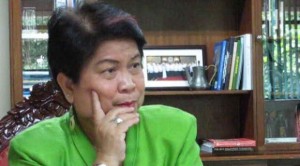TUBA, Benguet—Beneficiaries of projects financed through the Disbursement Acceleration Program are ready to testify on behalf of Malacañang, to reverse a Supreme Court ruling that declared portions of the DAP unconstitutional, Social Welfare Secretary Corazon Soliman said here on Tuesday.
Soliman said the Department of Social Welfare and Development built 900 day care centers, as well as core shelters, classrooms and livelihood projects for the Autonomous Region in Muslim Mindanao using P1.9 billion facilitated through DAP.
The DSWD also has a university scholarship project coursed through the Commission on Higher Education (CHEd) and a skills program with the Technical Education and Skills Development Authority (Tesda), which also used DAP funds, she said at a forum here.
Soliman on Tuesday distributed in Tuba town in Benguet province checks covering small livelihood loans meant for families enrolled in the government’s conditional cash transfer program.
While the high court ruling acknowledged the good which DAP-funded projects did for many people, Soliman said it also had a chilling effect on the bureaucracy when the court asserted the wrong committed by everyone who enforced DAP projects.
She said the ruling qualified as liable all of DAP’s authors, sponsors and implementors, “including me and everyone here who implemented the program.”
“If it becomes necessary, we can present to the Supreme Court all the beneficiaries of DAP. We have very thick books of accounts which name each beneficiary, and which identifies how much they received. We can account for all these transactions. They don’t need to look for the beneficiaries, we will make them available,” she said.
She said the government has been discussing the impact of the ruling with its employees.
“The employees replied that they intend to continue serving the public. If that means we must go to jail for helping people, so be it,” she said.
But government employees have become more conscious about their expenditures, leading to delays, because of the backlash over DAP, she said.
“They now need to read documents over and over, consult lawyers or auditors before they sign spending plans,” she said. “But public servants need to be bolder. Each day that there is a delay means a day we have not helped a child, or another day a senior citizen has not received his pension.”
The ruling has frozen P200 million of DAP funds meant for ARMM, she said, adding that the money was intended for livelihood projects that were not pursued while the government awaited the liquidation report of DSWD’s ARMM office.
She said all ARMM projects were included in the General Appropriations Acts of 2012, 2013 and 2014 but were not allocated sufficient funds.
Soliman said the GAA could not allocate more ARMM funds to the DSWD because of budget ceilings imposed by the government.
“We set a budget ceiling for each agency because we don’t have a wellspring of funds to distribute to everyone,” she said.
ARMM remains one of the country’s poorest regions, she said, and its improvement is crucial for a country that is trying to fulfill the United Nations’ Millennium Development Goals of 2015.
The MDG requires all UN member-states like the Philippines to reduce the poverty rate by half in 2015.
Soliman said this translates to lowering the poverty rate in the Philippines to 16 percent of the population next year, which was possible before 2013.
RELATED STORIES
Gov’t lawyers appeal SC ruling on DAP
Churches mount black-and-white ribbon protest vsDAP
Court employees tell Aquino: Account for DAP, stop bullying


